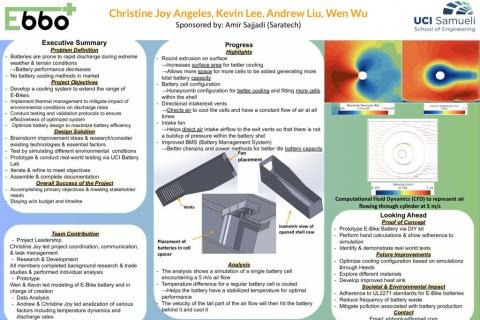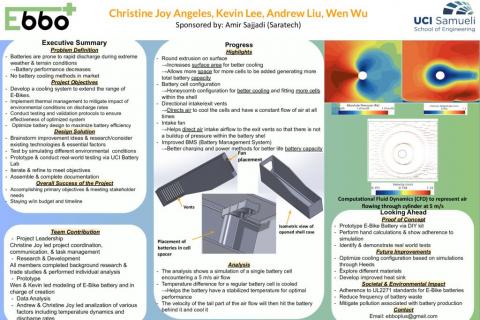2024 E-Bike Battery Optimization - Team 13
Summary:
In partnership with Saratech and the UCI Battery Lab, our project focuses on optimizing E-Bike batteries. We've selected lithium-ion batteries for their high energy density, long cycle life, and lightweight nature, ideal for electric bike applications. Specifically, we are opting for cylindrical battery types over prismatic and pouch cell types in order to prioritize airflow optimization for efficient cooling.
Recognizing overheating as a significant concern impacting battery performance, we're integrating a cooling system. This system includes a fan for air intake and strategically positioned vents for efficient outflow, ensuring optimal thermal regulation and prolonging battery life. Additionally, we employ simulation and CAD software like NX, SolidWorks, and StarCCM to analyze fluid dynamics, enhancing the effectiveness of our cooling design.
Background:
As electric bikes gain popularity for their efficient transportation, optimizing battery performance becomes essential. E-Bike Batteries serve as the power source. These batteries typically feature a block design, securely attached to the bike frame, yet easily removable for charging convenience. Understanding how batteries function is crucial. They operate via chemical reactions between the cathode and anode, with electrons moving through an external circuit, providing power. Increased usage or charging leads to temperature rises within the battery, exacerbating the risk of overheating. Traditionally, E-Bike Batteries employ passive air cooling, relying on airflow during rides to dissipate heat. However, this method poses risks of overheating during usage or charging, potentially shortening battery lifespan.
Goal and Objectives:
Our project goal is to design and build a battery system with an integrated cooling mechanism to extend an E-Bike’s range and optimize performance. We will implement thermal management strategies to mitigate environmental impact on discharge rates and conduct rigorous testing for system effectiveness. Having completed extensive research and initial 3D modeling, our next steps involve prototyping and data gathering for further optimization. Ultimately, our objective is to deliver a fully functional product demonstrating optimized performance by the spring quarter.
FAQ:
- What sets our project different from other E-bikes in the market?
-Our battery will include a cooling system to maintain the battery's optimal temperature of -10 to 40 degrees Celsius.
- How will you prevent water and dust from coming into the battery pack?
-We plan on using a hydrophobic mesh to prevent the natural elements from coming inside and wrapping the battery with heat shrink tube to make it IP65 certified.
- What is important about the cooling feature?
-The cooling features aids the batteries in order to keep them in a stabilized and operational temperature. This prevents them from overheating and losing performance over time.
- What will our battery cost?
-Our battery will be around the $300 range, the same price as other competitors in the market.
- How can I know more about this project?
-Feel free to message our group email: ebboplus@gmail.com, or any of our members listed down below.
Team Contacts:
Christine Joy Angeles cjangel1@uci.edu
Andrew Liu liua24@uci.edu
Wen Wu wlwu1@uci.edu
Wen-Kai Kevin Lee wenkaikl@uci.edu
Sponsors/Advisors:
Sponsor: Amir Sajjadi (Saratech) amir.yousef.sajjadi@gmail.com
Main Advisor: Mark Walter m.walter@uci.edu
Advisor: David Copp dcopp@uci.edu



